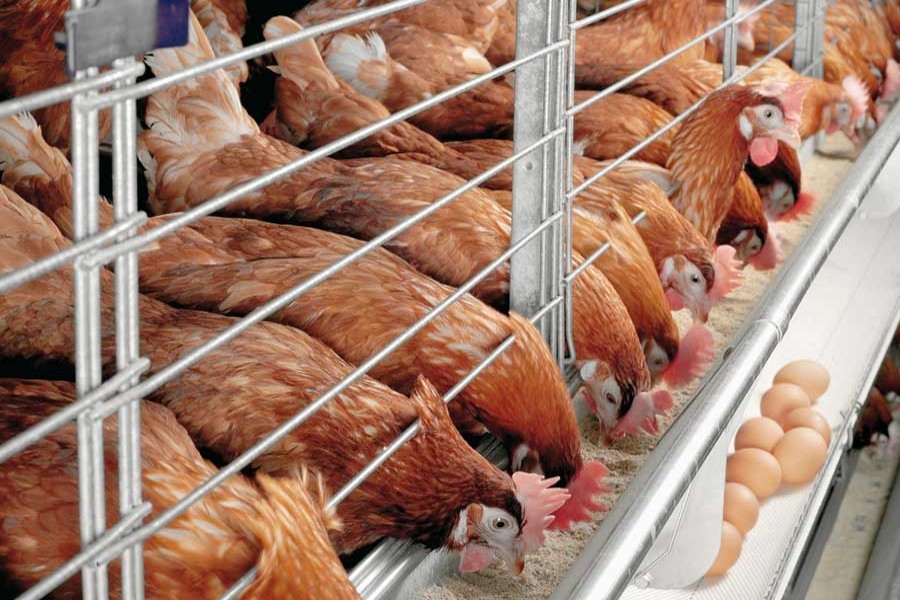Amid the many fairs and exhibitions held in the capital and elsewhere, the 11th International Poultry Show-2019 that ended early this week didn't at all cause any stir. The Show slipped away quietly, and trying to find out the issues that figured in the three-day event will surely dishearten those who are keen to see the country's poultry industry as potentially capable of bringing significant improvement in rural earnings and employment while meeting mounting domestic demands. From the newspaper reports, albeit scratchy ones, it appears that the organisers of the show found it quite heartening that the country is going to export halal poultry meat to the Middle Eastern countries in no distant future.
Exporting is no doubt encouraging, but what the sector needs at this time is consolidation, a well planned road map to move ahead. Besides, there are critical areas that need to be addressed comprehensively. While feed remains a major problem, frequent outbreak of killing epidemics, inadequate medical supplies, lack of insurance and bank credit are some of the problems that the sector has long been trying to ride out, but to no significant success. However, despite these and many more constraints, the country's poultry industry has been able to grow remarkably well in the recent decades.
That the country's poultry industry would grow to such prominence was not at all anticipated when around three decades back small entrepreneurs began to tread on this uncharted territory with no clear vision of the fate it held for them in the years to come. There were no special facilitating measures in place to cater to the needs of the new sector except what the government's veterinary department had to offer with limited resources and expertise. Despite the initial constraints, the sector saw a boom with more and more entrepreneurs rushing into it. In less than a decade, poultry became the bread earner of a sizable population. In the years following, the sector grew steadily despite occasional hiccups, to demonstrate a visibly commendable role in the economy. A look at the contribution of the sector to the country's economy will, among others, reveal the highly laudable employment it generates, that too in rural and semi-rural areas. No wonder, this sector is the second highest employment provider in the private arena, next only to readymade garment. Endowed with its unique distinction of rural employment, mass migration of labour -- common to most other sectors -- has not happened to add to the population burden in urban areas. From small and apparently tentative strides, this sector emerged on its own right to satisfy the most valued protein requirement of the country's 160 million people.
The country's poultry sector with an estimated investment of more than Tk 200 billion is fraught with problems that need immediate attention. Lack of access to finance in terms of affordable bank credit, anomalies in duty structure of imported materials-- particularly feed, 'unfair' competition from foreign farms and frequent outbreak of avian flue are some of the known maladies threatening the growth of this highly prospective sector.
Concerned quarters are of the opinion that unless the government comes up with a proactive poultry policy and an effective plan of action, things are not going to be rosy in the days to come. There is a critical need for the much desired harmony between consumer demand for eggs and broiler meat and planned production. This, in the first place, may necessitate substantial input of resources by way of doubling the parent stock, hatcheries, broiler and layer farms, feed meal plants, among others. The government's farm credit policy, which excludes poultry sector from its eligible credit-worthy sub-sectors, should also be forthcoming to find ways to extend a helping hand to this susceptible but highly prospective sector.
Industry leaders complain that following the severe setback suffered by the sector due to intermittent attacks of avian flu years ago, the government should have been more forthcoming in providing the required support that the sector badly needed to overcome its difficulties. Such supports, they hold, could come by way of fiscal incentives such as exemption of poultry materials from import duties and VAT for a certain period of time, particularly in respect of import of bio-security kits which are used to prevent the outbreak of avian flue.
To the prevailing situation a new threat from foreign competitors now appears to be no less challenging. It is being alleged that the foreign farms operating in the country are far more competitive because of the soft loans they avail from their banks at home, compared to the unaffordable loan terms in Bangladesh's commercial banks. Besides low-cost fund, they are better equipped with high-tech machinery and composite feed. There is a growing fear that the local breeding farms would find it extremely difficult to compete with the foreign companies if the present situation persists. At present the number of breeding farms is around a hundred, and in the face of uneven competition a good number of them might perish soon, opined industry insiders. There are questions, too, on the legality of the operation of some of these foreign farms. If this allegation contains even the slightest trace of truth, the authorities must sit up to examine the matter.
Under the circumstances, a proactive poultry policy not only to address the problems facing the sector but also to strengthen its potential with required facilitations is the need of the hour.


